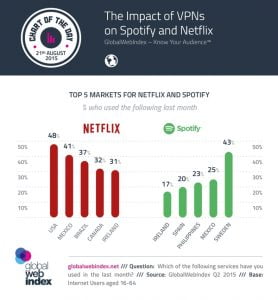Despite geo-blocks, a significant number of Internet users are aware of how to access restricted content through VPNs, according to this research from Global Web Index.
The market research firm tracks the use of online services in 34 different countries and claims that more than 20 percent of adults surveyed in developing online markets like Vietnam, Indonesia, Thailand, Brazil, and India are using VPNs to access the content they want before it launches there.
So called “Netflix pirates” have come under scrutiny in the recent past with fears that Netflix would attempt to ban the users access the streaming service through a VPN.
Hopping geo-blocks often exists in a legal grey area. The region that the VPN user is in may not necessarily have agreements with the content’s rights holders although the user has paid for access to the streaming service, like Netflix or Spotify.
“Although this trend may worry rights holders, VPN users should not be seen as a threat per se,” says GWI’s Felim McGrath. “In fact, they are more likely than average to be paying for music or video streaming services and, at the very least, these figures demonstrate the possibilities that exist for services like Spotify and Netflix to expand into even more markets.”
GWI’s survey shows though that the US is still the top market for Netflix and Sweden, the home of Spotify, is the music streaming giant’s most popular country.
But Mexico and Brazil, for example, are proving to be hotbed for Netflix users as well.
Meanwhile in Europe, the EU’s Digital Agenda for Europe initiative, which tackles a wide array of online issues for EU citizens, is calling for an end to all geo-blocks online across the continent.


